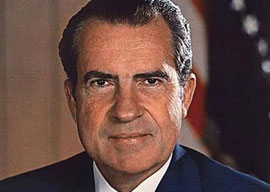
November 19, 2013

President Richard M. Nixon
Then and there, Vietnam became America’s war.
Kennedy had made a famous phone call to Mrs. Martin Luther King during the 1960 campaign when her husband had been arrested. Yet, he kept his administration away from the March on Washington and directed J. Edgar Hoover to wiretap Dr. King to learn of his associations with Communists.
Since his death, Kennedy’s reputation has been ravaged by revelations of assignations and mistresses from Marilyn Monroe to Mafia molls to White House interns from Miss Porter’s School.
All of this was covered up by his courtier journalists who would collaborate in perpetuating the Kennedy myth and collude in destroying their great hate object, Richard Nixon.
Yet, contrast what Nixon did, with what JFK failed to do.
Where Kennedy managed to get Gov. George Wallace to admit two black students to the University of Alabama, Nixon desegregated 70% of all Southern public schools.
Where the JFK-LBJ administration spent eight years putting 535,000 U.S. troops into a war they could neither end nor win, Nixon withdrew all U.S. troops in four years, brought home the POWs, and left every provincial capital in South Vietnamese hands.
Where Kennedy had the Peace Corps, Nixon ended the draft, gave 18-year-olds the right to vote, created an Environmental Protection Agency and a Cancer Institute and an Occupational Health and Safety Administration.
Where Kennedy gave speeches about detente, Nixon negotiated the greatest arms treaties since the Washington Naval Agreement—SALT I and the ABM treaty—ended decades of hostility between the U.S. and the People’s Republic of China, rescued Israel in the Yom Kippur War, and pulled Egypt out of the Soviet bloc into the U.S. camp.
Creating a new majority that would dominate presidential politics until 1992, Nixon was rewarded with a 49-state landslide in 1972.
Whereupon a press elite that had maintained a conspiracy of silence on Kennedy’s misconduct, seized on Nixon’s failure to deal decisively with misconduct in his campaign to bring him down in the first successful coup d’etat in U.S. political history.
The mythologizing of JFK and demonization of Nixon tell us less about respective accomplishments than the moral character of an establishment, which, though it had lost America by ‘72, still controlled the culture, media, bureaucracy and Congress.
And as they brought down Nixon with Watergate, they would seek to bring down Reagan with Iran-Contra. But that coup failed.